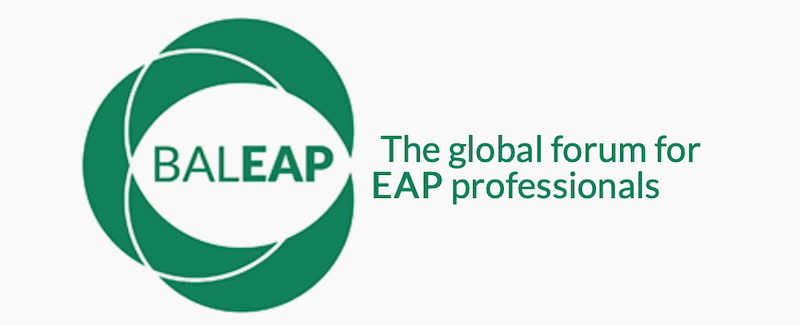Reflections on BALEAP 2023
Reflections on BALEAP 2023
Kassandra Robertson
Last week I was honored to attend the annual BALEAP Conference, held this year at the University of Warwick in the UK, along with co-collaborators Michael, Ilkem, and Merve to share insights from our project on EAP practitioner identity as well as to present my own ongoing research on optimizing learning for the information-overloaded knowledge economy. My talk, focused on prioritizing relevancy and efficiency in curriculum design, was received with plenty of engagement and positive feedback. As with many of the sessions, the advent of AI technologies like ChatGPT in the past several months have lent a new dimension to the topic, and it was energizing to facilitate the lively discussion that followed right into tea break time.
The conference featured sessions on a range of topics centered on the theme of ‘EAP under DE-construction’ across several formats. As my own presentation was especially concerned with issues surrounding use of generative chatbots in education, one session I found particularly fascinating was “The Use of Artificial Intelligence (AI) in Academic Writing: Implications for EAP”, in which presenters Debra Jones and Neil Adam Tibbetts shared findings from their ongoing investigation into the perceptions of students and lecturers on the acceptability of tools across the AI spectrum, from Google Translate and Grammarly to ChatGPT, in academic writing. Their presentation was illuminating in parsing out not only the particular situations considered more acceptable (e.g., looking up a vocabulary word), but in attempting to characterize the ambiguous dependencies upon which particular perceptions are predicated – including for instance the purpose of the task (to evaluate content knowledge vs. language proficiency) and the motivations of students with regard to language-learning (instrumental vs. intrinsic). Their research revealed an impressive degree of intentionality among students in their use of such tools as a means for ‘self-scaffolding’ and pointed to a need for greater transparency surrounding this issue from both sides as well as for training students in using them responsibly.
Another session that proved valuable in deconstructing long-held beliefs about teaching EAP was “That thing we don’t talk about: Facilitating and assessing student collaborative assignments”, where speakers Averil Bolster and Peter Levrai broke down emergent concepts related to the management and evaluation of groupwork. As a recovering skeptic, my own experiences colored by the all-American gospel of individuality ever at odds with the insistence on groupwork as the one true and noble path to enlightenment, I was relieved to find myself in good company, and genuinely appreciated dissecting this topic with a small group of colleagues from the University of Reading. Together we explored various approaches to facilitating collaborative work – from considering the extent of our involvement as the ‘meddler in the middle’ to strategies for promoting ‘buy-in’ and accountability (e.g., assigning roles) – as well as the thorny issues surrounding evaluation. It was a practical exchange of insights within our small collective as several instructors seemed highly knowledgeable and experienced in navigating the dicey ins and outs of groupwork, and personally I emerged with some new tools for managing this in my own classrooms such as raising students’ awareness of the value of teamwork for professional life, even and perhaps especially when they have a really hard time getting on with their groupmates.
All in all, it was a very valuable and professionally invigorating experience, and I’m thankful for the opportunity to contribute to such an esteemed conference.

